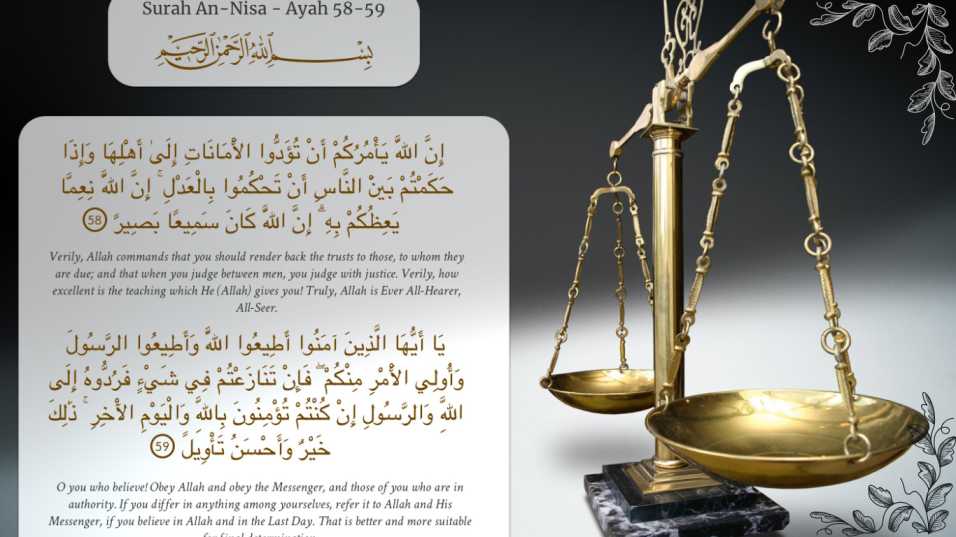Justice and Compassion in the Quran: A Divine Balance
 In a world full of chaos, pain, and injustice, many of us look for moral clarity and spiritual grounding. For Muslims, that clarity is beautifully found in the teachings of the Qur’an. Two values that stand out consistently are justice and compassion — not just as abstract concepts, but as essential pillars of faith. In fact, justice and compassion in the Quran are deeply intertwined, shaping how we treat others, live our lives, and connect with our Creator.
In a world full of chaos, pain, and injustice, many of us look for moral clarity and spiritual grounding. For Muslims, that clarity is beautifully found in the teachings of the Qur’an. Two values that stand out consistently are justice and compassion — not just as abstract concepts, but as essential pillars of faith. In fact, justice and compassion in the Quran are deeply intertwined, shaping how we treat others, live our lives, and connect with our Creator.
Whether you’re trying to become a better person, understand Islam more deeply, or simply reflect on spiritual values, this post explores the profound guidance on justice and compassion in the Quran and how you can bring those values into your everyday life.
Justice in the Qur’an: More Than a Virtue — A Command
The Qur’an doesn’t treat justice as optional or situational. It’s a divine order. Allah commands believers to stand up for what is right, even when it’s hard, uncomfortable, or against one’s own interest. This reveals just how central Justice and Compassion in the Quran truly are.
🔹 Surah An-Nisa (4:135):
“O you who believe! Stand firmly for justice as witnesses to Allah, even if it is against yourselves, or your parents, or your kin…”
This verse clearly shows that upholding justice isn’t about convenience — it’s about principle. Whether someone is rich or poor, justice remains the same. This uncompromising stance is part of what makes Justice and Compassion in the Quran so powerful and transformative.
🔹 Surah Al-Ma’idah (5:8):
“…Let not the hatred of a people prevent you from being just. Be just: that is nearer to righteousness.”
This verse is incredibly relevant today. It tells us not to let emotions like anger, bias, or revenge interfere with justice. Even when wronged, Islam calls for fairness — a recurring theme when reflecting on justice and compassion in the Quran.
Compassion in the Qur’an: Rooted in Divine Mercy
Right from the very beginning of the Qur’an, we’re reminded of Allah’s mercy. Every chapter (except one) starts with:
“In the name of Allah, the Most Gracious, the Most Merciful”
(Bismillahir Rahmanir Raheem)
These words introduce us to the compassionate nature of our Lord. Justice and compassion in the Quran aren’t just human values — they reflect Allah’s own names: Ar-Rahman (The Most Merciful) and Ar-Raheem (The Most Compassionate).
🔹 Surah Al-Anbiya (21:107):
“And We have not sent you, [O Muhammad], except as a mercy to the worlds.”
The Prophet Muhammad ﷺ is described as a “mercy to the worlds.” His life was filled with acts of kindness — from showing love to orphans to forgiving those who tried to kill him. He embodied justice and compassion in the Quran like no one else.
Balancing Justice and Compassion in the Qur’an
One of the most beautiful aspects of the Qur’an is how it balances strength with softness. Justice and compassion in the Quran are not opposites; they go hand-in-hand. You don’t have to choose one at the expense of the other — Islam encourages both.
🔹 Surah Ash-Shura (42:40):
“The recompense for an injury is an injury equal thereto. But if a person forgives and makes reconciliation, his reward is due from Allah…”
This verse tells us justice is allowed — you can take what’s fair. But if you choose compassion and forgiveness, you are rewarded even more. That’s the unique balance of Justice and Compassion in the Quran: being fair doesn’t exclude being kind.
Stories from the Qur’an That Teach Justice and Compassion
Let’s look at a couple of stories that beautifully illustrate this balance:
📖 Prophet Yusuf (Joseph):
His life was full of injustice — betrayal by his brothers, false accusations, and prison. Yet when he had power, he chose forgiveness. He didn’t seek revenge. His story is a living example of Justice and Compassion in the Quran — being fair while showing mercy.
📖 Prophet Musa (Moses) and Pharaoh:
When Allah sent Prophet Musa to speak to Pharaoh, one of the worst tyrants in history, He instructed:
“And speak to him gently, that perhaps he may be reminded or fear [Allah].”
(Surah Taha 20:44)
Even when confronting a cruel ruler, Allah commanded gentleness. That’s Justice and Compassion in the Quran in action — never compromising truth, but delivering it with mercy.
Living Justice and Compassion Today
The Qur’an isn’t a book of theory. It’s a guidebook for real life. So how can we reflect Justice and Compassion in the Quran in our daily actions?
✅ Be Fair in Your Dealings
In business, at work, or at home — be just. Don’t cheat, don’t take advantage, and treat everyone with respect.
“Give full measure and weight with justice…” (Surah Al-An’am 6:152)
✅ Speak Up for the Oppressed
Whether it’s racism, bullying, or injustice at any level, Islam teaches us to stand up. You don’t need a big platform. A small voice matters when it’s on the side of truth. This is a way to embody Justice and Compassion in the Quran.
✅ Show Mercy to Those Around You
Forgive others. Be gentle in your words. Offer kindness even when you’re hurting. This is what Justice and Compassion in the Quran look like in real life.
✅ Reflect Before Reacting
Sometimes, being just means holding back judgment. Sometimes, compassion means offering someone a second chance. Let the Qur’an guide your responses, and you’ll see how naturally Justice and Compassion in the Quran can shape your character.
Why Justice and Compassion in the Quran Matter More Than Ever
In today’s divided world, we’re often pushed to choose sides, to “cancel,” to hate. But Justice and Compassion in the Quran remind us there’s another way — a divine path that uplifts, heals, and brings balance.
As Muslims, we’re not just expected to believe in these values —we’re called to live them. From the way we interact online to how we raise our children to how we treat strangers — the Qur’an gives us a blueprint for a just and compassionate life.
Final Thoughts: Let the Qur’an Shape Your Character
To be truly guided by the Qur’an is to embody its values — and few are more central than Justice and Compassion in the Quran. These are not just noble ideas. They are divine instructions that, when followed, lead to a more peaceful heart, a fairer society, and a stronger connection with Allah.
So let’s strive to live by these beautiful teachings. Let’s reflect Justice and Compassion in the Quran in our own lives — through every word, action, and intention.
For more blogs The History of Ramadan: A Sacred Month of Fasting and Reflection -2025

